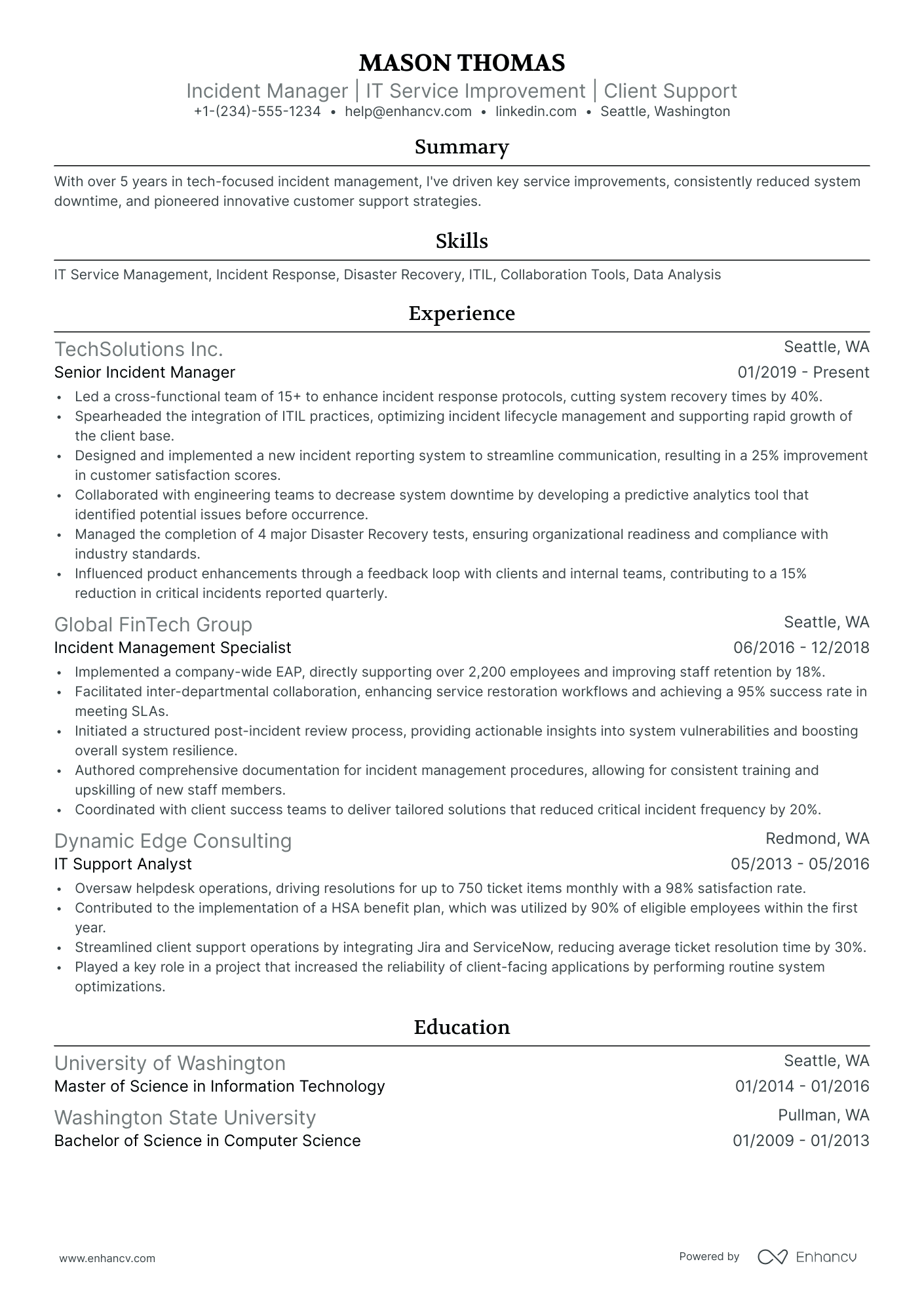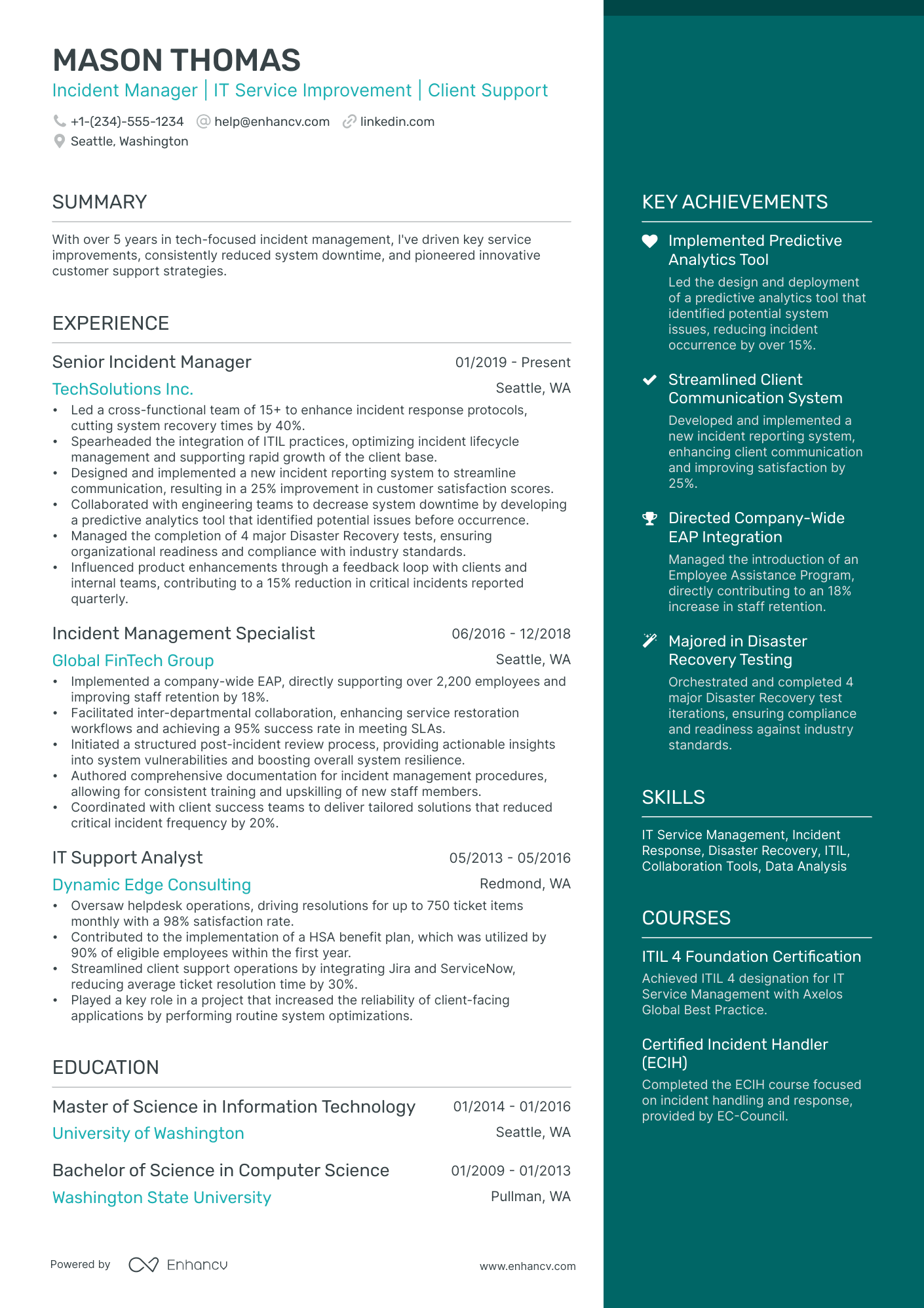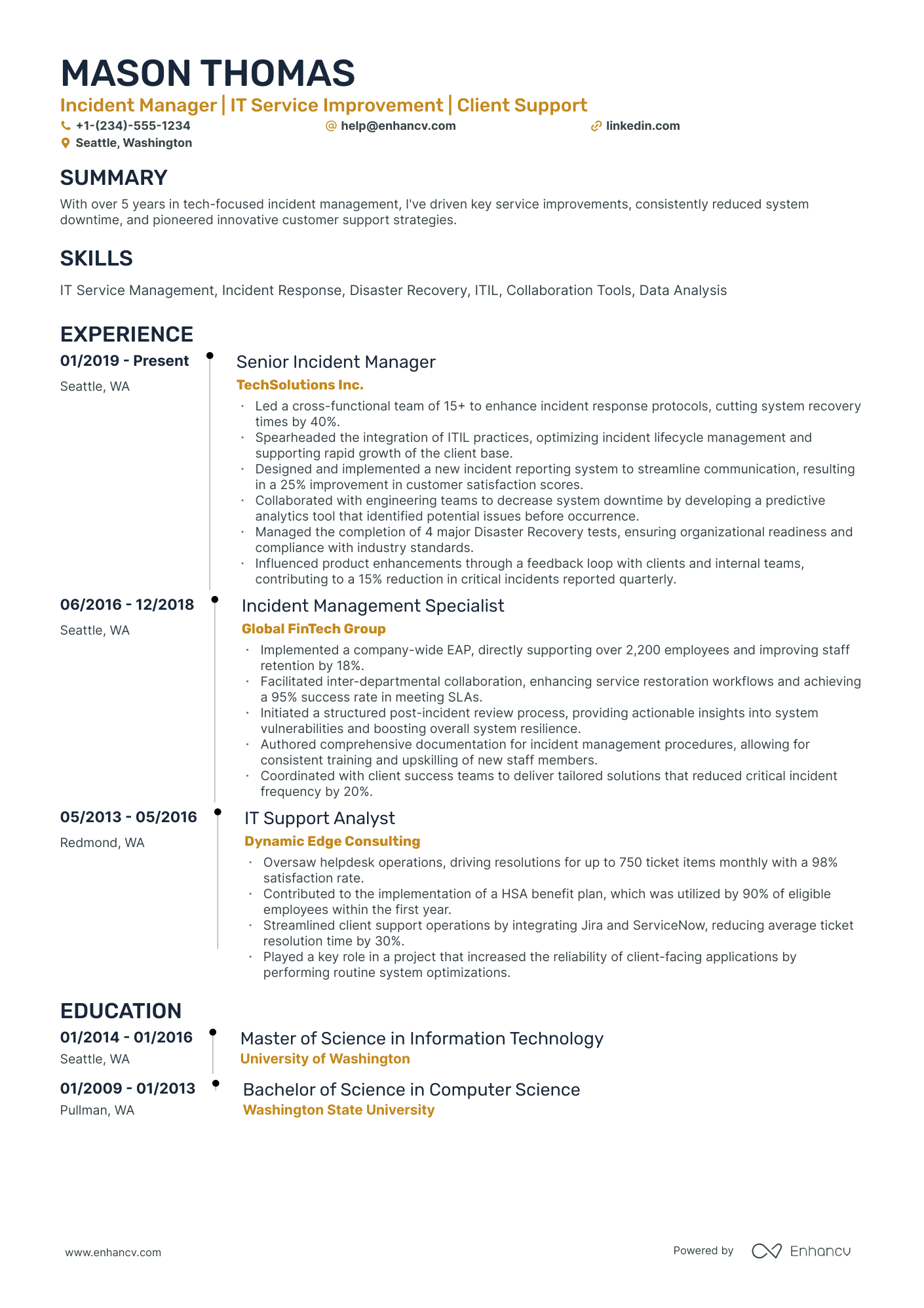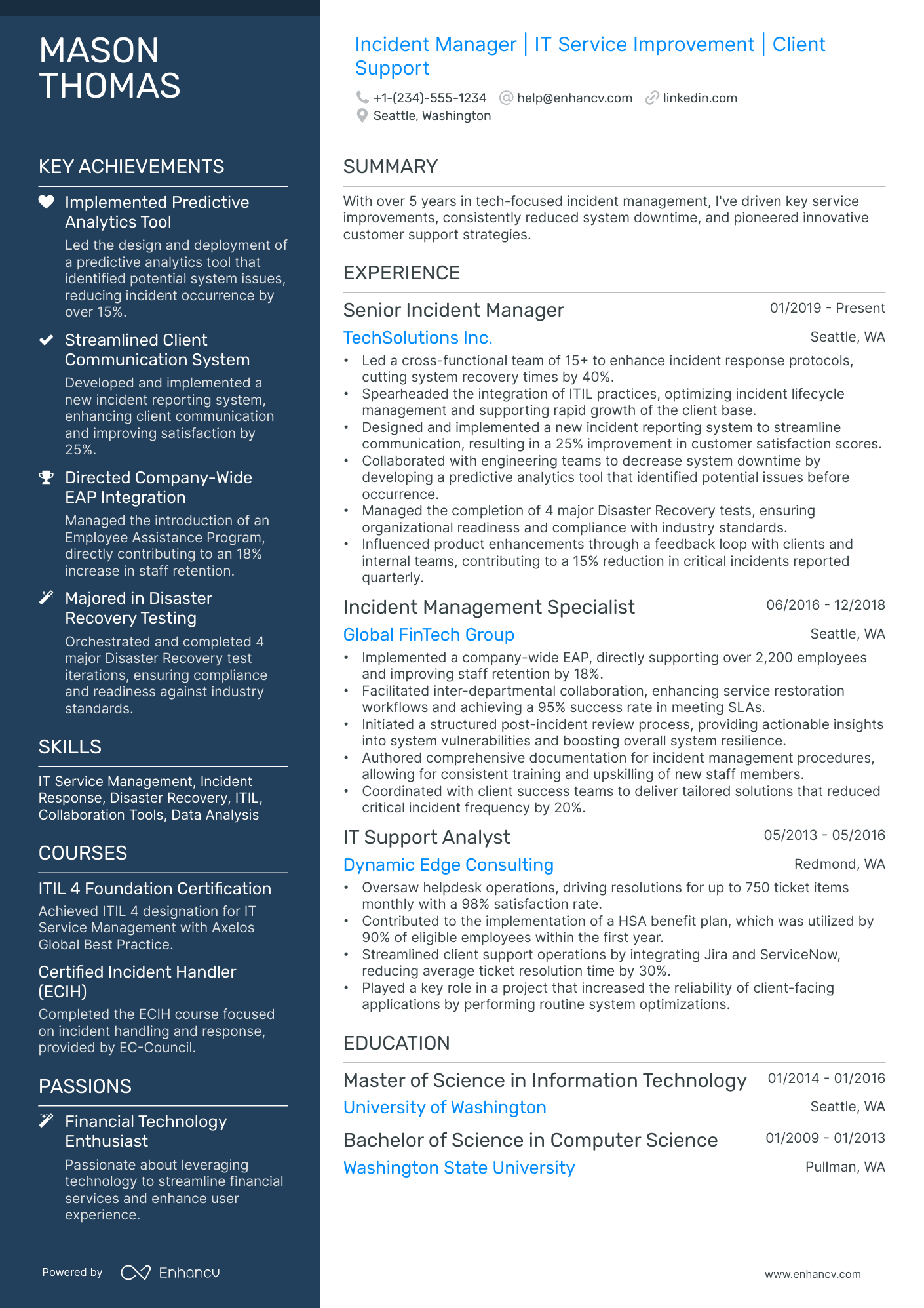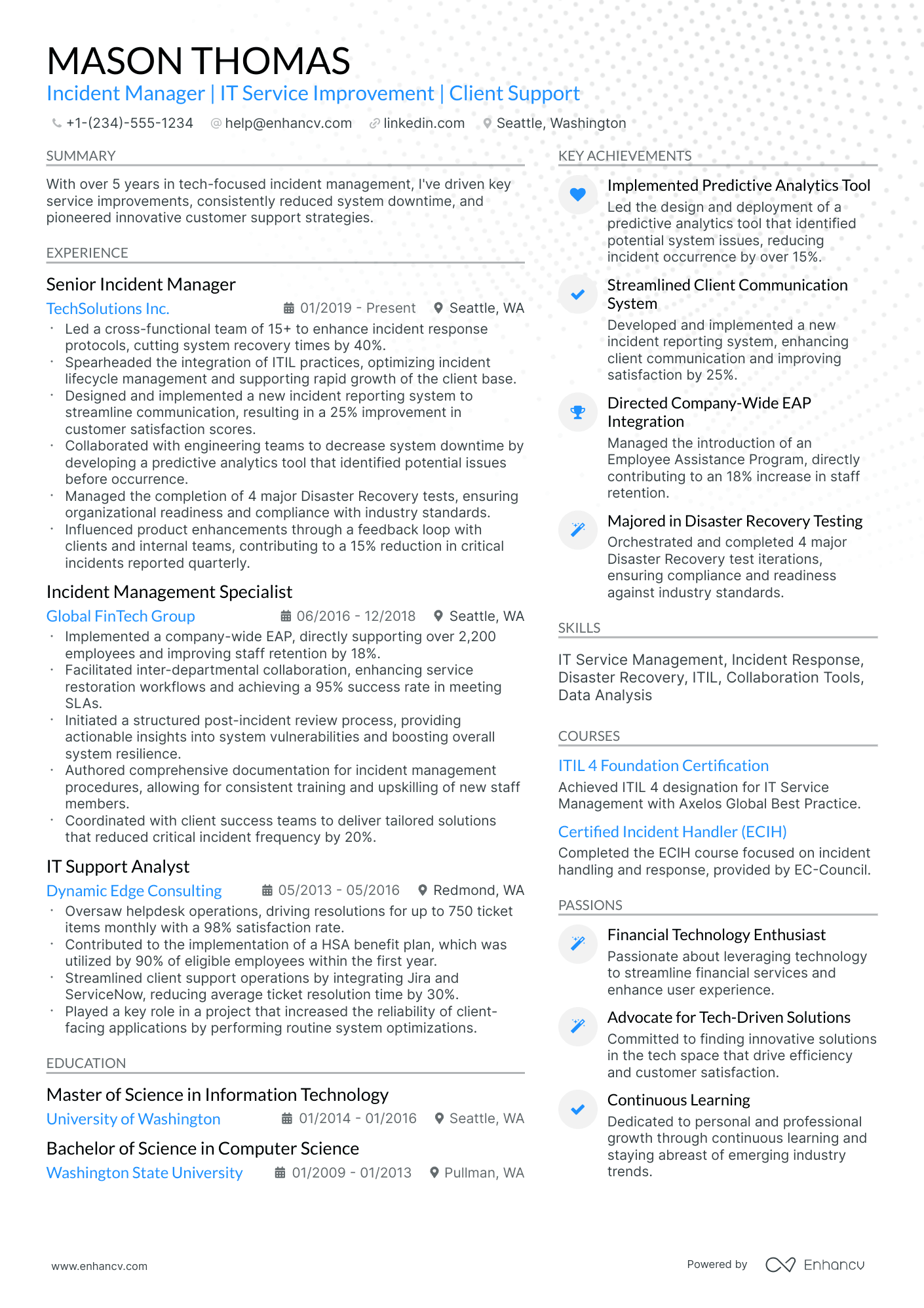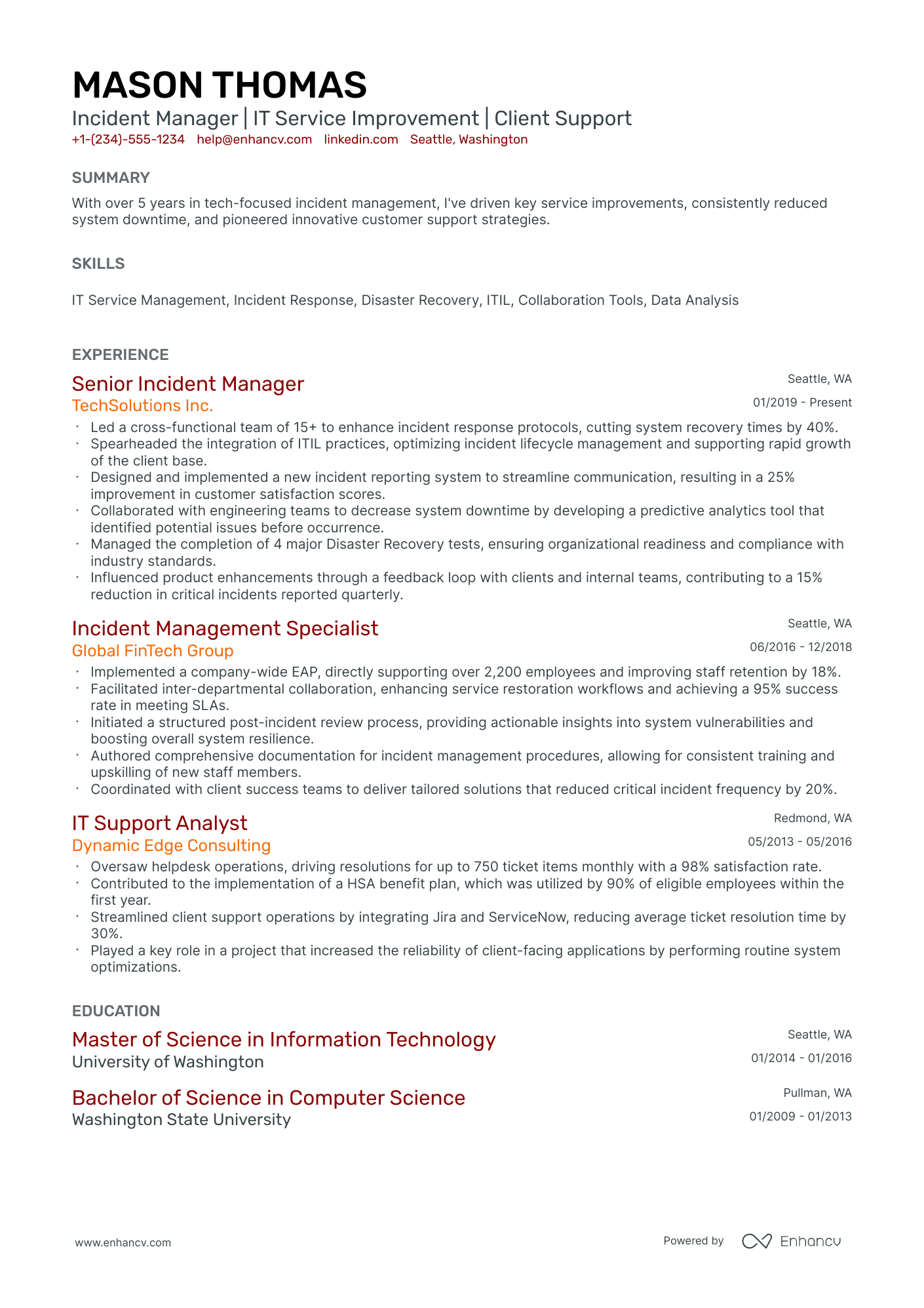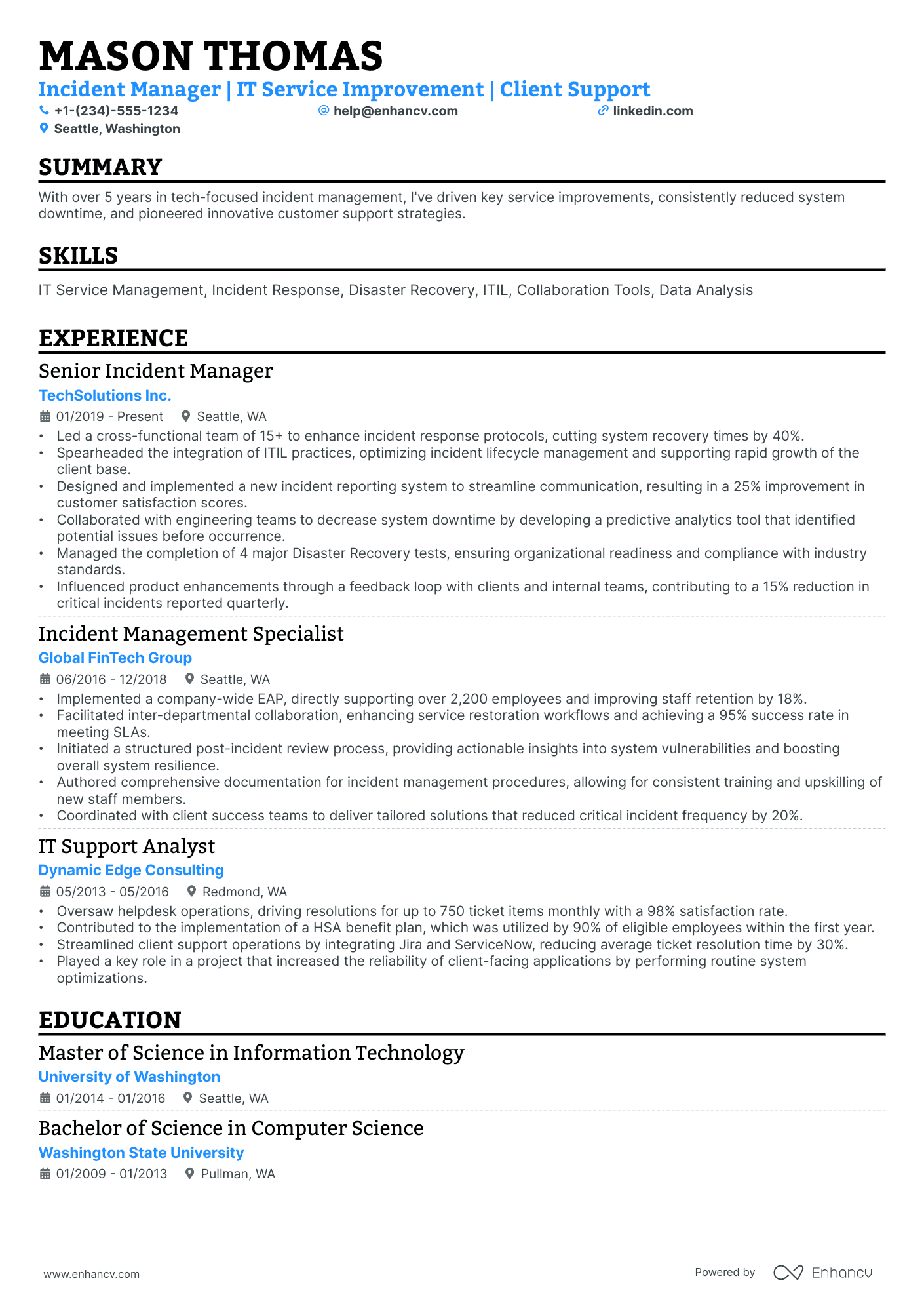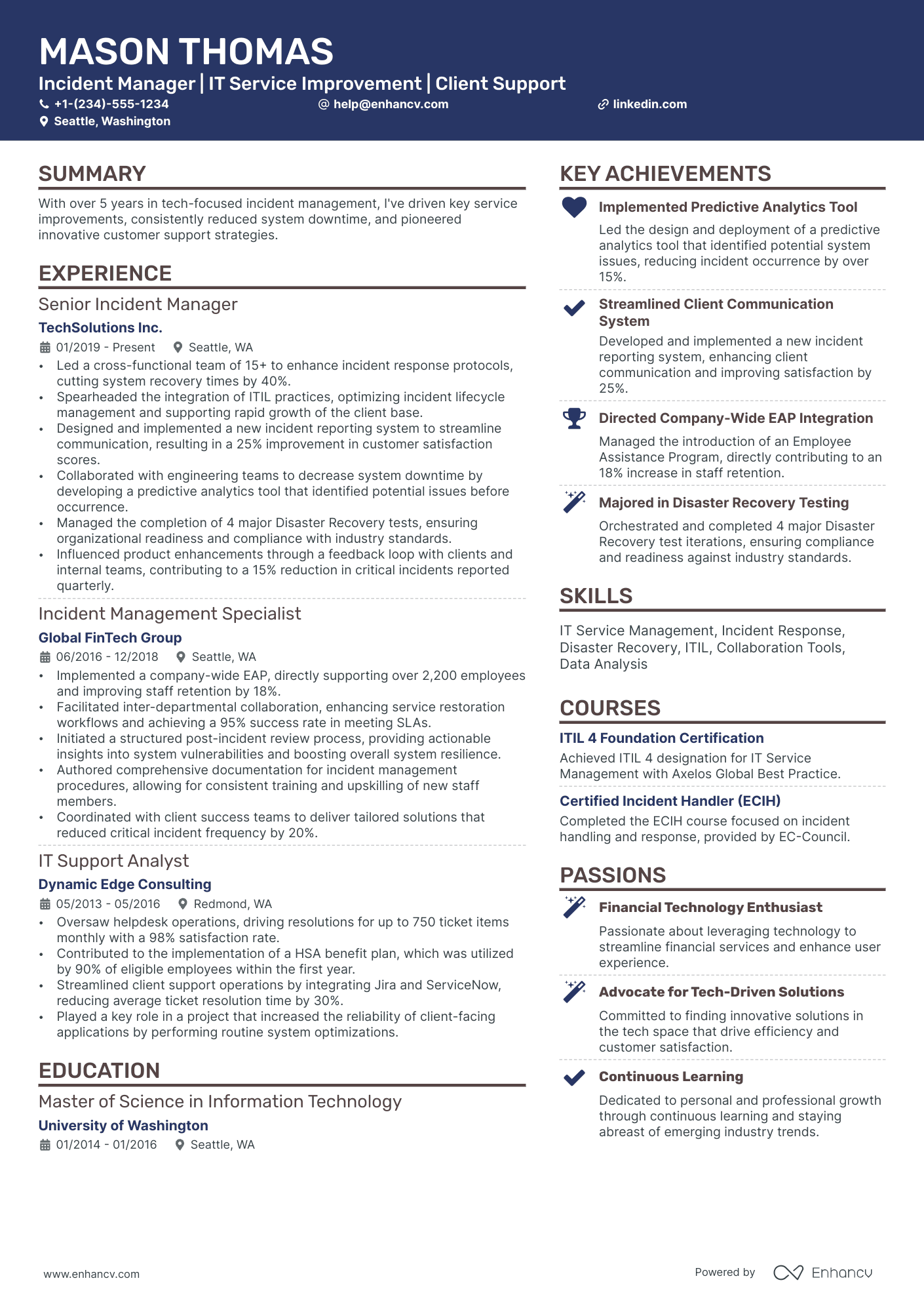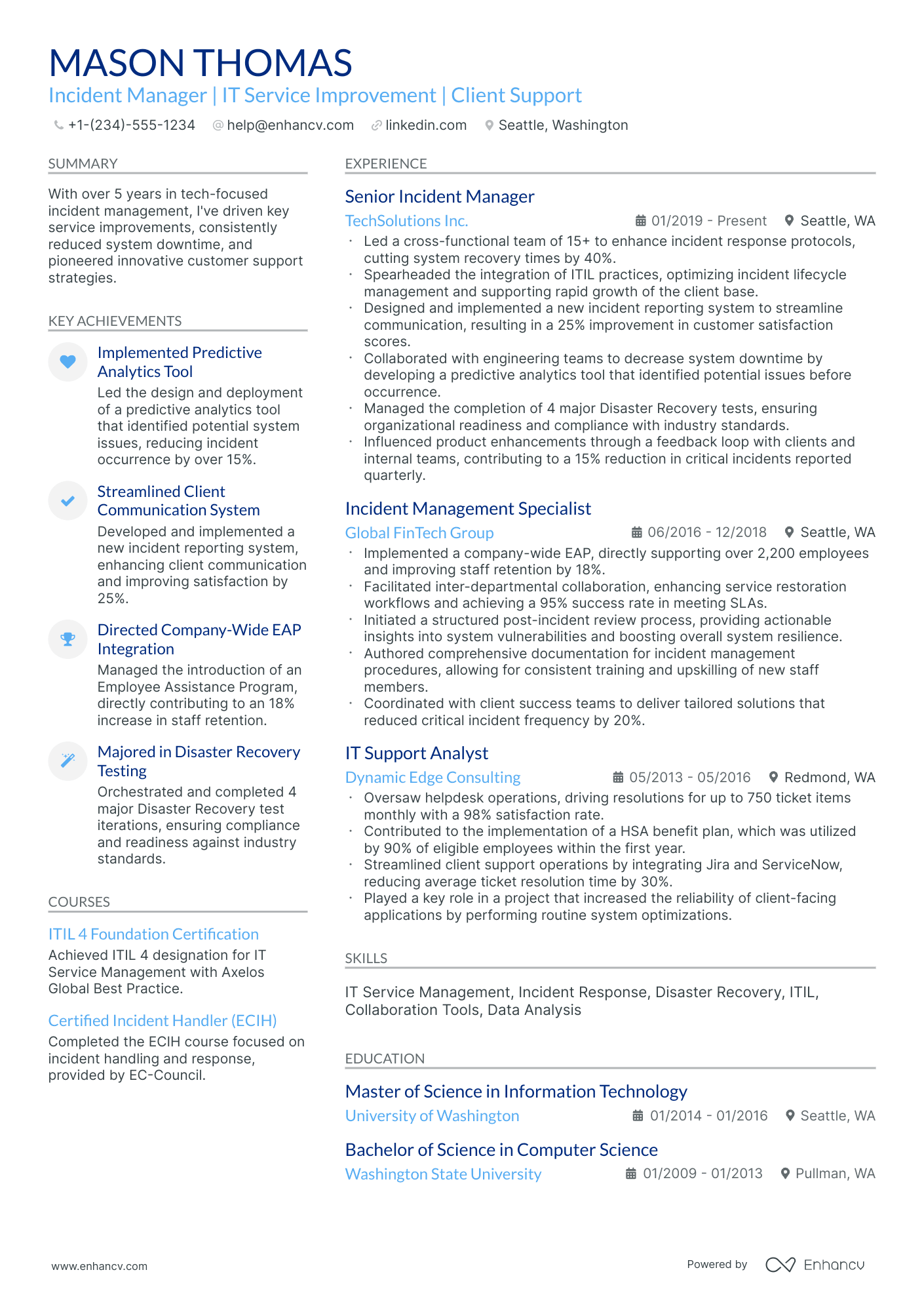As an incident manager, you might find articulating the breadth of your crisis-management skills and rapid decision-making abilities in a concise resume format challenging. Our guide offers targeted strategies and examples to showcase your incident management expertise effectively, ensuring your resume stands out to potential employers.
- The most effective incident manager resume samples, reflecting on experience and skills.
- +10 simple, yet impactful methods to tailor your incident manager resume to the job advert.
- Using your professional achievements as the North Star to your unique value as a incident manager candidate.
- 'No one cares about your education nowadays …' Let's prove this statement wrong with the best-kept industry secrets to your education and certifications.
If the incident manager resume isn't the right one for you, take a look at other related guides we have:
Is there a correct way to format your incident manager resume?
This is a tricky question. While skimming over your resume, recruiters will be looking at your experience and the message your profile conveys. That's why your resume format needs to be clear and concise, serving to supplement and organize your experience. Professional best practices point that the best incident manager resumes:
- Follow the reverse chronological order, where the most recent experience items are presented first . This is to keep your expertise succinct and to show recruiters your career growth over the years;
- Have a clearly defined header that includes all relevant contact information and a portfolio or a LinkedIn link. In some countries, it is acceptable to include a professional photo , so that your application is more memorable;
- Feature the most important incident manager resume sections towards the top, e.g. summary, skills, and experience. That way, recruiters can immediately find information that is relevant to the role;
- Take up no more than two pages - and two pages are the exception for more experienced professionals. Keep your expertise to the point and use your incident manager resume real estate wisely .
- Selecting modern, yet simple fonts, e.g. Rubik, Lato, etc., would help your application stand out;
- Many candidates stick with the tried-and-tested Arial or Times New Roman, but you'd want your incident manager resume to be a bit more unique;
- The ATS can read all serif and sans-serif fonts, so you should avoid fancy, formal script (or cursive) fonts.
Your resume should match the market – Canadian applications, for instance, may use a different layout.
Upload & Check Your Resume
Drop your resume here or choose a file. PDF & DOCX only. Max 2MB file size.
PRO TIP
The more time and effort you've put into obtaining the relevant certificate, the closer to the top it should be listed. This is especially important for more senior roles and if the company you're applying for is more forward-facing.
The key to your incident manager job-winning resume - present your expertise with these sections:
- A header to make your resume more scannable
- Snapshot of who you are as a professional with your resume soft skills, achievements, and summary or objective
- Job advert keywords in the skills section of your resume
- Resume experience quantifying your past job successes with metrics
- A relevant education, certification, and technical sills section to provide background to your technological/software capabilities
What recruiters want to see on your resume:
- Demonstrated ability to lead and manage IT service management (ITSM) processes in incident management, including rapid response to incidents, coordination of cross-functional teams, and minimizing service disruption.
- Experience with incident management tools and platforms, such as ServiceNow, JIRA Service Desk, or BMC Remedy, showing technical proficiency in handling and documenting incidents.
- Strong track record in problem-solving and root cause analysis to prevent the recurrence of incidents and improve response strategies over time.
- Excellent communication skills, including the ability to communicate effectively with technical teams, stakeholders, and senior management during high-pressure incidents.
- Experience in developing and conducting incident response drills and training programs to ensure organizational preparedness and a high level of incident management maturity.
Quick guide to your incident manager resume experience section
After deciding on the format of your resume, it's time to organize your experience within the dedicated section.
It's common for incident manager professionals to be confused in this part of the process, as they may have too much or little expertise.
Follow the general rules of thumb to be successful when writing this part of your resume:
- The perfect number of bullets you should have under each experience item is no more than six;
- Select not merely your responsibilities, but the most noteworthy achievements for each role that match the job requirements;
- List any certificates or technical expertise you've gained on the job and how they've helped you progress as a professional;
- Carefully select the power verbs to go along with each bullet to avoid generic ones like "managed" and instead substitute those with the actuality of your particular responsibility;
- Integrate valuable keywords from the job advert in the form of achievements under each role you list.
If you're on the search for further advice on how to write your incident manager experience section, get some ideas from real-world professional resumes:
- Spearheaded the development and implementation of incident management protocols, reducing system downtime by 30%.
- Orchestrated a team of 15 across IT departments to ensure timely resolution of incidents, improving customer satisfaction by 25%.
- Managed a high-profile incident recovery for a critical data breach, coordinating with cybersecurity teams to restore services within a 4-hour window.
- Introduced automation tools for incident tracking, which increased the incident resolution rate by 20% due to improved response times.
- Led cross-functional weekly review meetings, analyzing incident trends, and proposed strategic solutions that decreased repeat incidents by 15%.
- Facilitated incident management training for 50+ IT support staff, elevating the overall incident handling effectiveness.
- Managed over 200 critical incidents, ensuring compliance with SLAs and maintaining a 98% customer satisfaction rating.
- Developed, tested, and refined a comprehensive business continuity plan, ensuring minimal service disruption during outages.
- Conducted quarterly incident simulations to proactively identify potential risks and develop mitigation strategies, improving preparedness by 40%.
- Implemented an ITIL-based incident management framework that reduced Mean Time to Restore (MTTR) by 35% in the first year.
- Collaborated with technology vendors to streamline issue resolution processes, which decreased the volume of major incidents by 50% over two years.
- Championed the adoption of a new incident logging system that improved data accuracy and incident tracking, leading to a more efficient allocation of IT resources.
- Created a centralized incident reporting hub, integrating input from multiple channels and improving response time by 25%.
- Authored comprehensive monthly incident reports that delivered actionable insights, driving a 20% reduction in critical system incidents.
- Pioneered a customer communication strategy during incidents, which improved transparency and reduced incoming support tickets by 40%.
- Coordinated with IT Service Management to overhaul the major incident process, leading to a 10% improvement in critical systems uptime.
- Designed and led a company-wide incident response drill, enhancing organizational readiness and incident handling capability.
- Introduced a post-mortem analysis practice for incidents, which provided insights for future prevention and reduced recurring issues by 30%.
- Oversaw the Incident Management team for cloud-based services, maintaining 99.9% uptime and exceeding service level agreements consistently.
- Drove the adoption of predictive analytics for incident occurrence, which preemptively identified 60% of potential system anomalies.
- Collaborated with the DevOps team to seamlessly integrate incident management with continuous deployment pipelines, thus reducing deployment-related incidents by 30%.
- Led a rapid response team for network incidents, directly contributing to the recovery of critical operations within strict timeframes.
- Developed incident response strategies that led to a 45% reduction in cybersecurity breach impacts across company networks.
- Launched an innovative real-time incident tracking system, which provided dynamic updates to stakeholders, minimizing informational delays during critical incidents.
- Chaired the deployment of an enterprise-wide incident management system, expediting the response process and improving incident log accuracy.
- Formulated best-practice documentation contributing to a 25% improvement in incident response efficiency for the technical support team.
- Coordinated with international IT teams during global incidents, ensuring consistent and effective response strategies across multiple time zones.
- Directed the successful execution of an IT incident recovery operation for a major server outage, affecting over 10,000 users, with full service restoration achieved within 8 hours.
- Collaborated with risk management to integrate incident findings into the enterprise risk framework, reducing the probability of recurring incidents by 20%.
- Mentored junior incident managers, developing a skilled team that improved overall departmental performance and incident handling times.
Quantifying impact on your resume
- Highlight the number of high-impact incidents managed and resolved to demonstrate experience and effectiveness.
- Specify the size of the teams led or coordinated during incident response situations, showing leadership and teamwork abilities.
- Include the percentage reduction of system downtime achieved through efficient incident management, indicating proficiency in minimizing disruptions.
- Mention the average response and resolution times for incidents to showcase rapid problem-solving skills.
- List the number of cross-departmental collaborations forged for incident management, exhibiting the ability to work across the organization.
- Quantify the extent of your involvement in developing or improving incident management protocols and procedures.
- Detail any cost savings realized through effective incident management, underscoring a direct impact on the company's bottom line.
- Enumerate any major incidents that you specifically took the lead in resolving, providing concrete examples of your capability.
Action verbs for your incident manager resume
What if my incident manager experience doesn't match the requirements?
You've just graduated from college and may have no real world job experience . What should you include within your resume then?
Instead of making up information or adding irrelevant past jobs (e.g. your on-campus work during freshman year), you can:
- Shift the focus from your professional experience to your community impact with your volunteer work. This would showcase numerous soft skills you've built over time (e.g. interpersonal communication);
- Highlight the projects you've completed, as part of your coursework, or, on your own. Thus, you will align your technical background with recruiters' requirements;
- Consider spotlighting your transferrable skills. Or, what lessons and talents your current professional and personal experience has taught you and how they could benefit your potential employers;
- Even if you've had a few months of internship experience, that is relevant for the role, make sure to include this. Recruiters do care about the years of experience you happen to have, but, at the end of the day, your profile would also be assessed based on role alignment.
Recommended reads:
PRO TIP
If you happen to have plenty of certificates, select the ones that are most applicable and sought-after across the industry. Organize them by relevance to the role you're applying for.
Balancing hard and soft skills in your incident manager resume
Recruiters indeed pay close attention to the specific hard and soft skills candidates possess. Hard skills refer to technical abilities or your proficiency in technologies, while soft skills are the personal attributes and qualities developed over your lifetime.
If you're unsure about effectively quantifying these skills on your resume, follow our step-by-step guide. It's crucial to first understand the key job requirements for the role. Doing so enables you to accurately list your:
- Hard skills in sections like skills, education, and certifications. Your technical expertise is straightforward to quantify. Most organizations find it sufficient to mention the certificates you've earned, along with your proficiency level.
- Soft skills within your experience, achievements, strengths, etc. Defining interpersonal communication traits in your resume can be challenging. Focus on showcasing the accomplishments you've achieved through these skills.
Remember, when tailoring your incident manager resume, ensure that the skills you list match exactly with those in the job requirements. For instance, if the job listing specifies "Microsoft Word," include this exact term rather than just "Word" or "MSO."
Top skills for your incident manager resume:
ITIL Framework
ServiceNow
JIRA
Splunk
Nagios
Microsoft Excel
Incident Response Tools
Monitoring Software
Network Management Systems
Data Analysis Tools
Problem Solving
Communication
Team Collaboration
Leadership
Time Management
Adaptability
Critical Thinking
Conflict Resolution
Customer Service
Stress Management
PRO TIP
List your educational qualifications and certifications in reverse chronological order.
Education section and most popular incident manager certifications for your resume
Your resume education section is crucial. It can indicate a range of skills and experiences pertinent to the position.
- Mention only post-secondary qualifications, noting the institution and duration.
- If you're still studying, highlight your anticipated graduation date.
- Omit qualifications not pertinent to the role or sector.
- If it provides a chance to emphasize your accomplishments, describe your educational background, especially in a research-intensive setting.
Recruiters value incident manager candidates who have invested their personal time into their professional growth. That's why you should include both your relevant education and certification . Not only will this help you stand out amongst candidates, but showcase your dedication to the field. On your incident manager resume, ensure you've:
- Curated degrees and certificates that are relevant to the role
- Shown the institution you've obtained them from - for credibility
- Include the start and end dates (or if your education/certification is pending) to potentially fill in your experience gaps
- If applicable, include a couple of job advert keywords (skills or technologies) as part of the certification or degree description
If you decide to list miscellaneous certificates (that are irrelevant to the role), do so closer to the bottom of your resume. In that way, they'd come across as part of your personal interests, instead of experience. The team at Enhancv has created for you a list of the most popular incident manager certificates - to help you update your resume quicker:
The top 5 certifications for your incident manager resume:
- Certified Information Systems Security Professional (CISSP) - (ISC)²
- ITIL Foundation Certificate in IT Service Management - AXELOS
- Certified Information Security Manager (CISM) - ISACA
- Certified Incident Handler (GCIH) - GIAC
- Microsoft Certified: Cybersecurity Architect Expert - Microsoft
PRO TIP
The more time and effort you've put into obtaining the relevant certificate, the closer to the top it should be listed. This is especially important for more senior roles and if the company you're applying for is more forward-facing.
Recommended reads:
Incident manager resume summaries or objectives: real-world samples for best industry practices
Grasp recruiters' attention from the get-go of your application with a professional incident manager resume summary or objective.
It's wise to select the:
- Resume objective , if you don't happen to have much experience alignment and would like to more prominently feature your dreams and personality.
- Resume summary , if you'd like to have a more standard approach to your application and feature up to five career highlights to help you stand out.
Writing your resume summary or objective should be tailored to each role you apply for.
Think about what would impress the recruiters and go from there.
But, if you need further help with this introductory section, check out some real-world samples in the next part of this guide:
Resume summaries for a incident manager job
- Seasoned incident manager with over 10 years of experience in high-velocity IT environments, adept at minimizing downtime and enhancing system availability. Strong expertise in ITIL frameworks, crisis management, and critical communication. Proven track record in successfully leading company-wide recovery efforts during major outages, reducing recovery time by 40%.
- Dynamic professional with 8 years of experience in cybersecurity, transitioning into an Incident Management role. Proficient in rapid threat assessment, digital forensics, and implementing robust security protocols. Spearheaded a cross-functional team that reduced incident response time by 50% through the adoption of automated security solutions.
- Former Military Operations Specialist now pursuing a career in Incident Management. Bringing a disciplined approach and strategic planning skills, with an exemplary record in managing complex field operations and emergency response scenarios. Skilled in logistics coordination and adept at leading teams under high-pressure situations.
- Accomplished incident manager with 15 years of experience specializing in the management of large-scale network incidents across multinational corporations. Expert in cross-team coordination, root cause analysis, and implementing continuous improvement processes. Recognized for designing and executing a recovery strategy that increased system resilience by 35% across key business units.
- Eager to apply a strong background in customer service and problem-solving to a new career in Incident Management. Possess exceptional organizational abilities and a commitment to maintaining high service standards. Motivated by the prospect of contributing to effective and efficient incident resolution processes in a dynamic and challenging environment.
- Recent graduate with a degree in Information Systems Management, aspiring to develop expertise in Incident Management. Passionate about leveraging analytical skills and theoretical knowledge to facilitate swift incident response and mitigation. Keen to hone technical skills in a fast-paced setting by directly engaging with complex incident scenarios.
Optimize your resume summary and objective for ATS
Drop your resume here or choose a file.
PDF & DOCX only. Max 2MB file size.
Additional valuable incident manager resume sections to stand out
When assessing candidate applications, recruiters are often on the lookout for elements that go beyond meeting standard requirements and technical expertise.
This is where extra sections could play a key role in showcasing your unique skill set and personality.
Make sure to include sections dedicated to:
- How you spend your free time, outside of work. The interests resume section also goes to show your personality and transferrable skills; and may also serve to fill in gaps in your experience;
- Most innovative work. The projects resume section brings focus to what you're most proud of within the field;
- How you're able to overcome language barriers. The language resume section is always nice to have, especially if communication would be a big part of your future role;
- Industry-wide recognitions. Remember that the awards resume section should highlight your most noteworthy accolades and prizes.
Key takeaways
- All aspects of your resume should be selected to support your bid for being the perfect candidate for the role;
- Be intentional about listing your skill set to be balanced with both technical and people capabilities, while aligning with the job;
- Include any experience items that are relevant to the role and ensure you feature the outcomes of your responsibilities;
- Use the summary or objective as a screenshot of your best experience highlights;
- Curate various resume sections to showcase personal, transferable skills.
